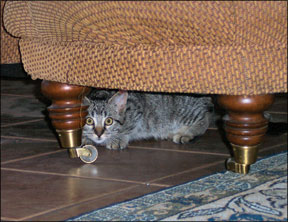When Kit, a 12-week-old female kitten, earnestly beckoned from her cage in a Manhattan animal shelter, Miriam knew she was the one. Miriam was lucky to adopt Kit, as many people had been admiring her.
Kit settled in with Miriam and her two roommates in a small apartment. Kit loved everyone; Miriam was even jealous when Kit would occasionally sleep on her roommates beds instead of her own. Kit played and romped and greeted people at the door as she

Bev Caldwell
288
grew into young cat-hood.
A year later, however, Kit is a feline terror. “I dont know what happened,” says Miriam, “but Kit now attacks people when they come in; she scratched my aunt who came to visit. No one wants to come to my house anymore, including my boyfriend! But shes so lovable to me.”
Miriam wonders how a cuddly kitten could have turned into such a hostile cat. She is now consulting her veterinarian on how to decrease Kits hostility and anger toward visitors.
You, too, may have a gentle cat that turns into a combative animal when other people come into your home. To your horror, your cat may literally chase people, hissing and clawing at them. Its unfortunate that people only see your cats nasty, scary and aggressive side. But it can also be dangerous (bites and scratches can cause serious infections in humans) for visitors and your cat. Heres some help in understanding behavior, and ways to help tame your ferocious feline.
Why the Anger?
“This kind of behavior can result from several things,” says Stefanie Schwartz, DVM, a board-certified member (diplomate) of the American College of Veterinary Behaviorists and a specialist at Angell Animal Medical Center in Boston. “It can happen from trauma related to a move, which sensitizes the cat to all things unfamiliar. Or the cat may be acting out a form of territorial aggression in which the cat is protecting its terrain – much as a dog would. Or it can be fear aggression – more of an anticipatory attack related to the cats fear of something.” To complicate matters, the cats behavior can be a combination of any of the above, says Dr. Schwartz.
Cats may also become aggressive if theyre ill or in pain. Feline hyperthyroidism – a tumor of the thyroid, resulting in overproduction of thyroid hormone – can result in physical and behavioral changes, but its not common in young cats. Nevertheless, its something to be ruled out, says Dr. Schwartz.
“There is one aggression issue that may not be as easily treated: if the cat was not socialized to people as a kitten,” says Dr. Schwartz. “Theres a crucial period of development which occurs when kittens are between three and seven weeks old. If a kitten isnt exposed to positive human interaction – or is exposed to negative interaction – this becomes part of the wiring of the cats brain, and sets the stage for future relationships,” says Dr. Schwarz. The kitten may bond with his primary human companion but then react badly to strangers. In this case, the antisocial behavior is much harder to modify than in other circumstances, such as following trauma.
Treat Aggression Aggressively
Address your cats aggression quickly, “because aggression tends to snowball and is self-reinforcing,” says Dr. Schwartz. “When your cat makes people run from her or feels better by defending her territory, this increases the cats aggressive behavior.”
Ultimately, you may need to find a veterinary behaviorist to evaluate and treat serious aggression of this kind. But first take your cat to your regular veterinarian to rule out any medical causes. If warranted, your vet can give you a recommendation for a behaviorist.
While waiting for your cat to be evaluated, confine it away from strangers or guests so that the cat doesnt hurt itself or any people who enter your home. “The whole point is that were protecting the cat,” says Dr. Schwartz, “so that she doesnt need to act upon her fears or territoriality.”
Before guests arrive, confine your cat in a comfortable room with food, water, litter, toys and a treat to keep her safe and occupied. Prepare the room in advance so that you can quickly place your cat in her safe haven if you have unexpected guests. If you know that people are coming over, give your cat lots of attention beforehand, if possible, by playing and cuddling with her. “This may relax or tire her so shell be less likely to object to being placed in the room,” says Dr. Schwartz.
Keep an Aggression Diary
Before you see your veterinarian or a veterinary behaviorist, determine if theres a pattern to the aggression:
- First, are you aware of any negative interactions she may have had with humans when she was a kitten? Was she younger than 12 weeks old when you adopted her?
- Is your cat aggressive with just males or just females, or doesnt gender matter?
- If your cat dislikes males, is it young teens, or any male who enters your home?
- Does your cat dislike children under the age of ten, or just toddlers?
- Does your cat become aggressive only when people first come in, or does she remain aggressive the whole time people are there?
- Does he run and cower in a corner, hissing when someone walks by him? Or does he actually go on the attack, darting up to people and biting their ankles or legs or trying to scratch them?
The veterinary behaviorist whom you consult will review your cats

Bev Caldwell
288
medical and social history; take into account your veterinarians findings; observe your cat, if possible, in your home and then recommend a treatment program. This may involve retraining your cat to accept interaction with strangers through desensitization or changing your cats environment to make him feel safer when people come into the home. Another alternative – which is considered if other methods arent successful – is the use of psychotropic psychoactive medicine to curb your cats aggression.
How to Help Your Guests
Its almost inevitable that at one time or another your aggressive cat will encounter people coming into your home. Here are steps to take to keep the peace:
- Keep your cats nails trimmed so that your cat cannot badly scratch anyone who enters your home.
- Make sure your cat is up-to-date on all her shots, especially rabies, and keep the vaccination information handy for legal protection in the event your cat does bite someone.
- Tell guests not to approach your cat or test her or try to make her get over her aggression. Cornering her will only increase her fear and aggression.
Helping your cat behave less aggressively toward your friends takes the skills of a veterinary behavior specialist to discover whats causing the behavior and your cooperation and determination in treating it. But the effort is worth it if you can get your cat to come in like a lion … and remain as a friendly cat who doesnt mind sharing your home with guests.



